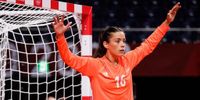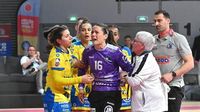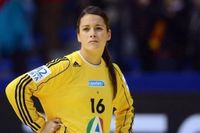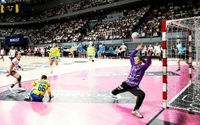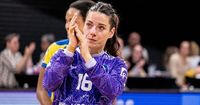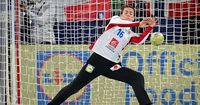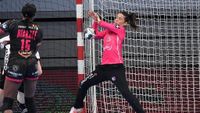In a bold and passionate declaration, Cléopâtre Darleux, the goalkeeper for Metz Handball, has taken a stand against the concussion protocol implemented by her federation, labeling it as "bidon" and "mal fait" during an interview with Le Républicain Lorrain on April 10, 2025. This comes in the wake of a harrowing incident during the Coupe de France semi-final on April 5, where Darleux was struck in the head during a match against her former club, Brest.
The incident occurred in the 57th minute of the match, when a powerful shot from Brest's Juliette Faure hit Darleux square in the face. The impact was severe enough to send her to the emergency room post-match, where she was diagnosed with inflammation. "I couldn’t see out of one eye for two hours. It was all white," Darleux recounted, her frustration evident as she spoke about the lack of adequate responses from officials regarding head injuries.
Despite the clear signs of injury, Darleux expressed her dissatisfaction with the referees' immediate reaction. "You can’t say they’re not aware of concussion issues; they instinctively say: protocol! But it’s bidon because it’s mal fait. They ask three questions, but that’s not where you’ll see something’s wrong," she stated, emphasizing the need for a more thorough examination of players who suffer head impacts.
Throughout her career, Darleux has faced her share of challenges, including a significant concussion that forced her to pause her career for over a year, from January 2023 to early 2024. After a long recovery, she returned just in time to compete in the Paris Games, where she helped the French national team secure a silver medal.
Now, as a seasoned player with over 200 caps for the national team, Darleux is advocating for stricter penalties for players who engage in risky behavior, particularly those who deliver reckless shots to the head. "It happens too often; it’s not normal. In rugby, they really examine these situations, and there are real sanctions. In handball, a player is only penalized with a two-minute exclusion," she argued, pointing out the stark contrast in how different sports handle such serious matters.
In her view, the current system is not sufficient to protect players, especially goalkeepers who are often left vulnerable. "There’s really no protection for goalkeepers. A player shooting with all their strength straight at the head should warrant a direct red card to prevent these incidents from happening," Darleux proposed, highlighting the need for more stringent measures to ensure player safety.
As of now, the French Handball Federation (FFHB) and the Ligue Féminine de Handball (LFH) have refrained from commenting on Darleux’s statements, choosing to await the outcome of ongoing discussions. However, the urgency of the situation cannot be understated as more players and officials begin to recognize the potential dangers of inadequate concussion protocols.
Cléopâtre Darleux’s bold stance has sparked a conversation around player safety and the effectiveness of current protocols in handball. With her experience and insight, she stands at the forefront of a movement demanding change in how head injuries are managed in the sport, advocating for a system that prioritizes the health and safety of all players.
As the debate continues, one thing is clear: Darleux’s voice will not go unheard, and her call for action may very well lead to a re-evaluation of how the sport addresses these critical issues.
